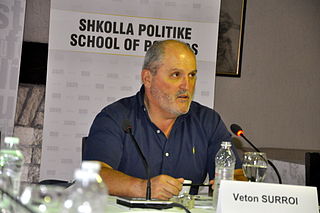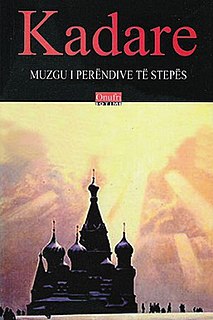Albanian culture or the culture of Albanians is a term that embodies the artistic, culinary, literary, musical, political and social elements that are representative of Albanians. Albanian culture has been considerably shaped by the geography and history of Albania, Kosovo, parts of Montenegro, parts of North Macedonia, and parts of Northern Greece, traditional homeland of Albanians. It grew from that of the Paleo-Balkan cultures, including Proto-Albanian, Illyrian, Thracian, Dacian, with their pagan beliefs and specific way of life in the wooded areas of far Southern Europe. Albanian culture has also been influenced by the Ancient Greeks, Romans, Byzantines and Ottomans.

Ismail Kadare is an Albanian novelist, poet, essayist, screenwriter, and playwright. He is a leading international literary figure and intellectual. He focused on poetry until the publication of his first novel, The General of the Dead Army, which made him famous internationally.
Albanian literature stretches back to the Middle Ages and comprises those literary texts and works written in Albanian. It may also refer to literature written by Albanians in Albania, Kosovo and the Albanian diaspora particularly in Italy. Albanian occupies an independent branch within the Indo-European family and does not have any other closely related language. The origin of Albanian is not entirely known, but it may be a successor of the ancient Illyrian language.

Dritëro Agolli was an Albanian poet, writer and politician. He studied in Leningrad in the Soviet Union, and wrote primarily poetry, but also short stories, essays, plays, and novels. He was head of the League of Writers and Artists of Albania from 1973 until 1992. He was a leading figure in the Albanian Communist nomenklatura.

The International Booker Prize is an international literary award hosted in the United Kingdom. The introduction of the International Prize to complement the Man Booker Prize was announced in June 2004. Sponsored by the Man Group, from 2005 until 2015 the award was given every two years to a living author of any nationality for a body of work published in English or generally available in English translation. It rewarded one author's "continued creativity, development and overall contribution to fiction on the world stage", and was a recognition of the writer's body of work rather than any one title.

Veton Surroi is a Kosovo-Albanian publicist, politician and former journalist. Surroi is the founder and former leader of the ORA political party, and was a member of Kosovo assembly from 2004 to 2008. Veton Surroi in 1997 established one of the biggest Kosovo Albanian daily newspapers Koha Ditore and was the editor-in-chief for a number of years before deciding to enter politics in Kosovo. Surroi's father, Rexhai Surroi, was one of the very few Albanians to become ambassadors of the former Yugoslavia. His father was the Yugoslav ambassador to Spain and a number of Latin American countries. As a result, Surroi spent a part of his life in the Spanish-speaking world where he was also educated.
David Bellos is an English-born translator and biographer. Bellos is Meredith Howland Pyne Professor of French Literature and Professor of Comparative Literature at Princeton University in the United States. He was director of Princeton's Program in Translation and Intercultural Communication from its inception in 2007 until July 1, 2019.
The Independent Foreign Fiction Prize (1990–2015) was a British literary award. It was inaugurated by British newspaper The Independent to honour contemporary fiction in translation in the United Kingdom. The award was first launched in 1990 and ran for five years before falling into abeyance. It was revived in 2001 with the financial support of Arts Council England. Beginning in 2011 the administration of the prize was taken over by BookTrust, but retaining the "Independent" in the name. In 2015, the award was disbanded in a "reconfiguration" in which it was merged with the Man Booker International Prize.
Rexhai Surroi was a Yugoslav Albanian journalist, diplomat and writer.

Broken April is a novel by Albanian author Ismail Kadare. Published in 1978, the book explores one of Kadare's recurring themes: how the past affects the present. The novel concerns about the centuries-old tradition of hospitality, blood feuds, and revenge killing in the highlands of north Albania in the 1930s.
Bilal Xhaferri was an Albanian writer and political dissident against the Albanian communist regime. He is seen as the representative poet of the Albanian Chameria.

Chronicle in Stone is a novel by Albanian author Ismail Kadare. First published in Albanian in 1971, and 16 years later in English translation, it describes life in a small Albanian city during World War II.

Klara Buda is a French Albanian journalist and writer. She is the former head of the Albanian Department of Radio France Internationale (RFI), which she left in 2010. Buda has also worked for UNESCO and the BBC. She is of French nationality and Albanian ethnicity. Buda writes prose, poetry, fiction and TV plays.

Elegy for Kosovo is an Albanian novel written by Ismail Kadare.
The Kadare Prize, established in 2015, is a literary prize awarded annually to a work by an Albanian author. It is named in honour of the Albanian writer Ismail Kadare. Winners are awarded 10,000 euros.

Agamemnon's Daughter is a 2003 novella by the Albanian writer and inaugural International Man Booker Prize winner Ismail Kadare. It is the first part of a diptych of which the second and longer part is The Successor. It is considered by many critics to be one of the author's greatest works.

The Palace of Dreams is a 1981 novel by the Albanian writer Ismail Kadare. Set ostensibly in the Ottoman Empire, but in a deliberately imprecise past shaded by myth and intended to represent the modern totalitarian state, The Palace of Dreams follows the rapid rise of Mark-Alem, a young Ottoman Albanian related to the powerful Köprülü family, within the bureaucratic regime of the title palace, a shady ministry whose objective is to gather, examine and interpret the dreams of the empire's subjects in order to uncover the master-dreams, which are believed to shell the future destiny of the Sultan and the state.

The Successor is a 2003 novel by the Albanian writer and inaugural International Man Booker Prize winner Ismail Kadare. It is the second part of a diptych of which the first part is the novella Agamemnon's Daughter. The diptych is ranked by many critics among the author's greatest works.

The Blinding Order is a short novel written by Ismail Kadare in 1984 and published in 1991, shortly after the collapse of the hoxhaist regime in Albania. Set in the 19th-century Ottoman Empire, The Blinding Order is a parable about the use of terror by authoritarian regimes, and it is linked through its main subplot to the author's banned 1981 novel The Palace of Dreams.

Twilight of the Eastern Gods is a novel by the Albanian author Ismail Kadare. It was published in installments in Albania between 1962 and 1978, and published in full in 1981 in the French translation of Jusuf Vrioni. The English translation by David Bellos, published in 2014, was made from Vrioni's French.












